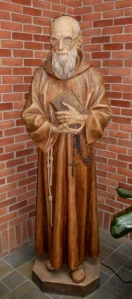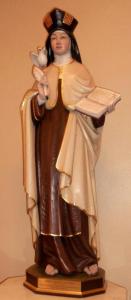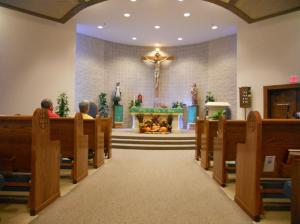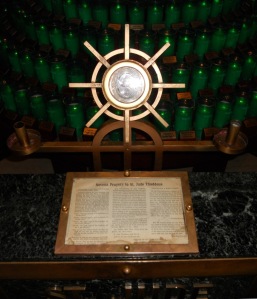Reading this morning’s American Catholic email, I experienced a déjà vu moment that whisked me back to October 2005, when I serendipitously stumbled across a quote that encapsulated my proposed study for dissertation.
Unintended consequences are when you had the intention of providing one service or message, and users interpret and practice it in ways you didn’t think of. The unintended consequences often have more significance than one might think (Claude Bernard, French psychologist, 1813-1878).
Tangible connections
Similarly, St. Peter Chrysologus, a church doctor, delivered succinct yet powerful homilies that “[produced] results far beyond his expectations and his intentions.” His heartfelt words and commonsensical approach were so enthusiastically delivered that people had no difficulty understanding the message: faithfulness to God’s word is achieved through prayer, mercy, and fasting— lessons so simple that anyone, then and now, could easily follow.
Golden
On a slightly different note, though, I immediately made the obvious connection between Chrysologus, the golden worded, and Chrysostom, the golden tongued. My wild imagination, coupled with my love of words, nuances, interpretations, and all things taxonomically Bloom, had me chuckling at the thought of both saints hosting websites and blogging to their hearts’ content to spread the good news in this lifetime.
March 14, 2014
There are three things by which faith stands firm, devotion remains constant, and virtue endures. They are prayer, fasting, and mercy. Prayer knocks at the door, fasting obtains, mercy receives. Prayer, mercy, and fasting: These three are one, and they give life to each other (St. Peter Chrysologus).
May 13, 2014
Listen to the Lord’s appeal: In me I want you to see your own body, your members, your heart, your bones, your blood. You may fear what is divine, but why not love what is human? You may run away from me as the Lord, but why not run to me as your father? Perhaps you are filled with shame for causing my bitter passion. Do not be afraid. This cross inflicts a mortal injury, not on me, but on death. These nails no longer pain me, but only deepen your love for me. I do not cry out because of these wounds, but through them I draw you into my heart. My body was stretched on the cross as a symbol not of how much I suffered, but of my all-embracing love. I count it no less to shed my blood: It is the price I have paid for your ransom. Come, then, return to me and learn to know me as your father who repays good for evil, love for injury, and boundless charity for piercing wounds.
Listen now to what the Apostle urges us to do. I appeal to you, he says, to present your bodies as a living sacrifice. By this exhortation of his, Paul has raised all men to priestly status.
How marvelous is the priesthood of the Christian, for he is both the victim that is offered on his own behalf and the priest who makes the offering. He does not need to go beyond himself to seek what he is to immolate to God: with himself and in himself he brings the sacrifice he is to offer God for himself. The victim remains and the priest remains, always one and the same. Immolated, the victim still lives: the priest who immolates cannot kill. Truly it is an amazing sacrifice in which a body is offered without being slain and blood is offered without being shed (St. Peter Chrysologus in his sermon, Each one of us is called to be both a sacrifice to God and his priest).
July 30, 2014
“Mildness overcomes anger, meekness extinguishes fury… patience is the scourge of impatience, gentle words vanquish quarrelsomeness, and humility prostrates pride” (St. Peter Chrysologus).
September 12, 2014
The name of Mary is a name of salvation for those who are regenerated; it is the insignia of virtue, the honor of chastity, the sacrifice agreeable to God, the virtue of hospitality, the school of sanctity, a name altogether maternal (St. Peter Chrysologus).
January 10, 2015
“The poor stretch forth the hand, but God receives what is offered” (St. Peter Chrysologus).
July 17, 2015
When you fast, see the fasting of others. If you want God to know that you are hungry, know that another is hungry. If you hope for mercy, show mercy. If you look for kindness, show kindness. If you want to receive, give. If you ask for yourself what you deny to others, your asking is a mockery (St. Peter Chrysologus).
July 30, 2015
“Let this be the pattern for all men when they practice mercy: Show mercy to others in the same way, with the same generosity, with the same promptness as you want others to show mercy to you” (St. Peter Chrysologus).
Links of interest… Building the kingdom with pencil & paper… St. Peter Chrysologus / bishop & teacher / doctor of short homilies / feast (July 30) / golden speech / memorial / prayer, fasting, mercy / profile (more) / sermons (book)… St. John Chrysostom: about / biography / church / doctor / feast / golden mouth (golden tongue) / hierarch / homilies / hourly prayers / life / on the Jesus prayer / quotes / vegan… the Word among us… Word of God: The sword of the Holy Spirit…
WP posts… Call of service… Church doctors… Mercy and justice… Prayerful messages… St. Chrysostom
Filed under: homilies, prayer, spiritual gifts, St. John Chrysostom, St. Peter Chrysologus | Tagged: building community, God's master plan, overcoming adversity | Leave a comment »




































